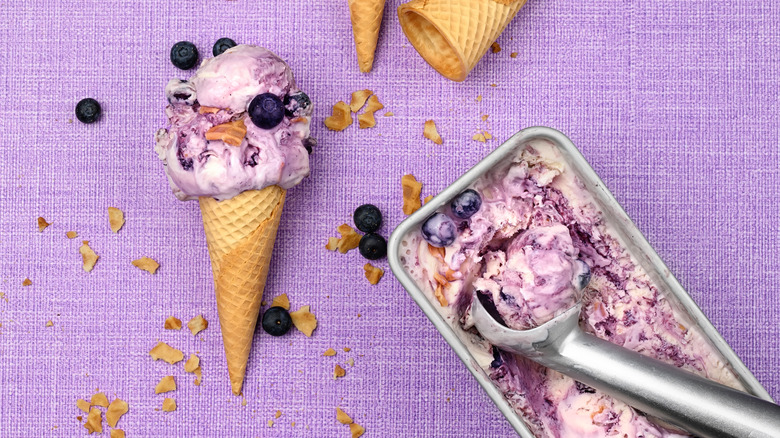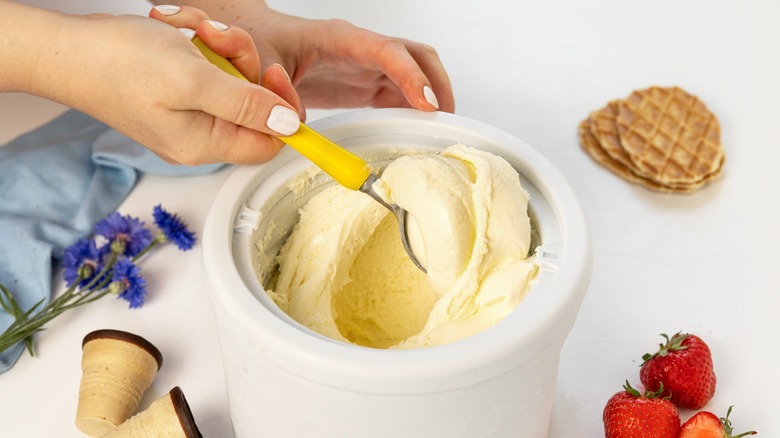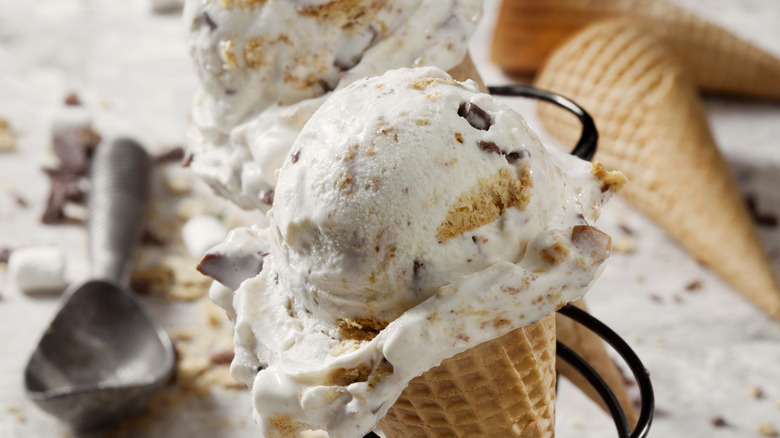These Ingredients Are Preventing Your Homemade Ice Cream From Freezing Properly
Love ice cream? You're certainly not alone. In 2024, the International Dairy Foods Association revealed their survey findings that a whopping 97% of Americans would describe their feelings toward ice cream as falling into either the "like" or "love" categories. That means it's possible more people agree about ice cream than literally anything else in the world. Favorite flavors include chocolate, vanilla, and cookie dough, and while those are all perfectly respectable choices, that's only the start of things when it comes to making your own homemade ice cream.
Then, the sky's the limit. Whip up a nutty, tahini ice cream one night, and yes, tomato ice cream is a very real and very delicious thing. Still, it's not a guarantee that your homemade attempts are going to end up as rich and creamy as your favorite commercially-produced brand, particularly if you get the ratios of three particular ingredients wrong. Those are alcohol, salt, and sugar.
What's the problem here? There are plenty of tips and tricks out there for making your own incredible ice cream, and many go back to one idea. There's an old saying that baking is a science, and the same is true of making ice cream. All three of those ingredients will change the freezing point of your ice cream if you add too much of any of them. Let's talk science and the benefits of a great recipe.
The proportions of your ice cream's ingredients are key
Salt, sugar, and alcohol all change the way that ice cream freezes, but that's not a bad thing. In fact, that's what allows ice cream to happen in the first place. On a molecular level, sugar (and milk fats) coat water to prevent your mixture from becoming frozen block of ice. The sugar content of ice cream also helps to guarantee that even at temperatures down to 0 Fahrenheit, it's not going to freeze solid.
Similarly, salt and alcohol will change the temperature that ice cream freezes at, and it's entirely possible to add enough of any one of these three ingredients that your ice cream just isn't going to freeze at all. It's worth noting that it's incredibly easy to throw off percentages, especially when it comes to sugars. Different fruits, for example, have a wide range of water and sugar content, which means you can't just add strawberries to an ice cream recipe that's been formulated for dried dates.
There's another footnote to this, too. If your ice cream freezes, but isn't as creamy as you might want it to be, that's because of the formation of ice crystals. That can happen because it took too long for the mixture to freeze, and there's a number of ways to do this by accident. Make sure that you're not only following instructions, but that you're not making any ingredient swaps that can throw off the ratios of your recipe.
Let's look at how alcohol acts in ice cream
Now, what if you'd like to make your own boozy ice cream? For starters, here's some food for thought that will help illustrate just how much of a temperature difference we're talking about: While water freezes at 32 Fahrenheit, 80-proof vodka freezes at -16 Fahrenheit. Wine, on the other hand, has a lower alcohol content and tends to freeze at around 22 Fahrenheit.
Adding too much doesn't just change the point at which homemade ice cream freezes when you pop it into the freezer for the first time, there's also the potential for other problems. If you add too much alcohol and try to make a cone out of that ice cream, it's going to melt really, really fast. Even when it's in your freezer, slight temperature fluctuations are going to encourage the development of ice crystals, and that's what makes your ice cream the opposite of creamy.
Because the proof of any given alcohol changes the freezing point by a considerable amount, there's no single rule for how much you can add to a batch of ice cream and still end up with creamy deliciousness. That said, there is a general sort of guideline which says that your ice cream base should never be more than 20% alcohol — if you want it to freeze, at least. That could mean (for example) that while you might be restricted to adding just a few tablespoons of a high-proof liquor, you may be able to add more of that Irish cream. It's a delicate balancing act, so finding good recipes is best.


